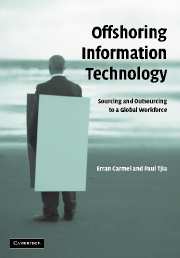Book contents
- Frontmatter
- Contents
- List of contributors
- Foreword
- Preface
- Acknowledgments
- Part I The fundamentals
- Part II Managerial competency
- Part III Other stakeholders
- 10 Building software industries in developing nations
- 11 Marketing of offshore services: the provider perspective
- 12 Offshore politics
- References
- End notes
- Index
10 - Building software industries in developing nations
from Part III - Other stakeholders
Published online by Cambridge University Press: 11 August 2009
- Frontmatter
- Contents
- List of contributors
- Foreword
- Preface
- Acknowledgments
- Part I The fundamentals
- Part II Managerial competency
- Part III Other stakeholders
- 10 Building software industries in developing nations
- 11 Marketing of offshore services: the provider perspective
- 12 Offshore politics
- References
- End notes
- Index
Summary
“… those countries in which science and technology is not applied as a guide to business, will fall behind and will be ever dependent on the development of others, for in today's society, those who use their knowledge and cleverness best, will be those who achieve advantage over others …”
José Mariá Castro Madriz, First President of Costa Rica, Speech to Congress, September 15, 1844“It is time to widen the scope of our participation in the knowledge economy from being mere isolated islands on the periphery of progress, to becoming an oasis of technology that can offer the prospect of economies of scale for those who venture to invest in our young available talent.”
King Abdullah II of Jordan, Speech to World Economic Forum in Davos, 2000 The King actively promotes the Jordanian software export sectorSoftware exports have become a cause for excitement in dozens of developing nations. These are nations that are all searching for the recipe to become the “next India.” India, once known as a land of poverty, has now become an IT superpower. Major Western software companies, including Microsoft, Oracle, and SAP, are using Indian software centers to develop their products. India's independent firms compete with the top firms from the industrialized nations.
This excitement is understandable since many developing countries are primarily exporters of commodities, such as cotton or coffee. Other export sectors, such as textiles, handicrafts, assembly, or manufacturing, offer primarily low-skilled employment with low wages, often with “sweatshop” working conditions.
- Type
- Chapter
- Information
- Offshoring Information TechnologySourcing and Outsourcing to a Global Workforce, pp. 199 - 218Publisher: Cambridge University PressPrint publication year: 2005



